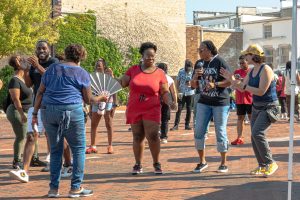Faulty wiring shocks worker, NIU
January 25, 1991
An order to discontinue maintenance on electrical food service equipment could have directly resulted in the electric shock of a civil service employee.
And high-ranking officials in charge of the matter were as surprised as those who took the order.
Kim Swenson, a food service employee at Neptune Hall, was taken by ambulance Jan. 14 to Kishwaukee Community Hospital to receive treatment for electric shock incurred while working with a food warmer unit, commonly known as a “hot box.” Swenson was released that same day.
Robert Fredrickson, director of University Food Service, said the incident began as Swenson touched a defective food warmer that was emitting electricity while simultaneously touching a properly working unit. The two units formed a circuit that shocked Swenson into a daze and raised questions as to why the faulty unit went undetected.
“It was a normal deterioration of electrical wiring aggravated by a moisture problem,” said Rob Vest, campus safety officer. “It’s a situation where the machines have to be taken apart and meticulously checked out. It cannot be a casual-type look.”
Frederickson confirmed that a regular maintenance program was implemented about 18 months ago to check the proper working of all electrical food service equipment. It began in response to a similar incident in which another food service employee was shocked. However, the program was mysteriously discontinued long before Swenson suffered her injuries.
Several sources who requested anonymity confirmed that the maintenance program was discontinued midsummer, and the electrical employees were laid off.
According to one source, the program was reinstated again on Thursday, three days after Swenson was injured. Both orders were issued from the Physical Plant.
“I was surprised to find the program wasn’t in full operation when the second accident victim was shocked last week,” said Pat Hewitt, associate vice president for Business and Operations. “It certainly was done without my knowledge or Jim Harder’s,” Hewitt said.
Harder, NIU’s vice president for business and operations, concurred with Hewitt’s statements.
Hewitt said a memo was sent before the second incident to Physical Plant Director John Harrod from Bill Herrmann, director of Bond Revenue Operations, expressly endorsing continuation of the maintenance program.
Harrod, who is a subordinate to both Hewitt and Harder, could not be reached for comment.
Hewitt ruled out lack of funding as a possible reason to discontinue the maintenance program, stating “money should never be a reason to discontinue projects instituted for safety purposes.”






